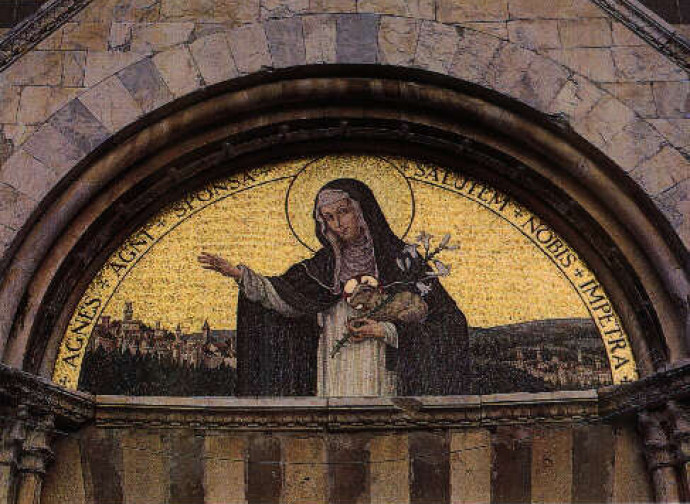Saint Agnes of Montepulciano
In 1374 Our Lord revealed to Saint Catherine of Siena that in Paradise she would enjoy a glory equal to that of Saint Agnes of Montepulciano (c. 1268-1317). This fact is indicative of the greatness of this relatively little known mystic.

In 1374 Our Lord revealed to Saint Catherine of Siena that in Paradise she would enjoy a glory equal to that of Saint Agnes of Montepulciano (c. 1268-1317). This fact is indicative of the greatness of this relatively little known mystic. Catherine had become very devoted to her, partly thanks to the biography written by her own spiritual director, Blessed Raimondo da Capua (c. 1330-1399), who began to write about Agnes at the time he became confessor in the monastery of Montepulciano, where the saint had lived her last earthly years. Her life was studded with wonders from birth, when suddenly several burning candles appeared in her room. The little girl immediately revealed a fervent spirit of prayer and at just nine years of age she joined the “sackcloth nuns” of her native village, so called because of their rough habit.
Agnes grew in piety under the guidance of Sister Margaret, the novices’ teacher. She was seen levitating several times and one day, during one of her continuous meditations on the Passion of Jesus, divine charity lifted her up to embrace the crucifix placed on the altar. When she was still an adolescent she was given three small stones by Our Lady: “My daughter, before you die you will build a monastery in my honour; take these three stones and remember that your building must be founded on constant faith and confession of the highest and indivisible Trinity”. For the fame of holiness that surrounded her even as a young girl, she was called to lead the new monastery that the “sackcloth nuns” had founded in nearby Proceno (province of Viterbo): Agnes, with a dispensation from Pope Martin IV, thus became abbess when she was just fifteen years old, an office that she accepted out of obedience. During the rite of investiture and the solemn blessing given by the bishop, abundant manna, whose grains were in the shape of a cross, descended onto the altar.
Saint Agnes participated in an extraordinary way in Jesus' sufferings and her soul was keen to be united with Him. Once, on the night of the Assumption, the Blessed Virgin appeared to her with the divine Child in her arms and offered Him to her so that she could kiss Him. Agnes did not want to part with him, but since she could do nothing else, she grabbed the little cross that the Infant Jesus wore around His neck, which is still preserved and exposed for worship on the day of her feast. The harsh penances she undertook during her twenty-year stay in Proceno cost her a serious illness, which worsened when she returned to Montepulciano. Here the saint, mindful of what her heavenly Mother had asked her to do, and after obtaining permission from the Bishop of Arezzo, Ildebrandino Guidi, in 1306 founded the monastery of Santa Maria Novella, which became a centre of Dominican spirituality.
The combination of love and pain, which elevated her to holiness, is clearly visible also in the many angelic apparitions she received. In her second period in Montepulciano, an angel led her mystically for nine consecutive Sundays to an olive tree, where she was given the chalice of the Passion to drink. To cure her health problems, her superiors sent her to the thermal baths of Chianciano. The saint did not heal, but thanks to her a new spring (which still bears her name), gushed forth. It proved miraculous, as on the occasion of the miracle performed on a little girl with a deep wound, whom Agnes herself healed by immersing her in the water. On her deathbed, she said to her weeping sisters: “If you really loved me, you would not cry like this; friends rejoice for the good that happens to their friends. The greatest good that can happen to me is to go to my Bridegroom. Be faithful to such a good Bridegroom!”. Then she added: “My beloved belongs to me, I will never abandon Him again!”. The Church of Saint Agnes in Montepulciano still preserves her incorrupt body in a glass case.
